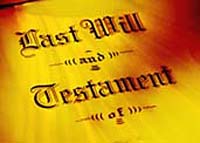
It sometimes comes down to what was the person’s intent.
The preparation of a will and estate plan is serious legal work. However, it can get very complex when a man executes three wills and doesn’t get one of them witnessed, according to nwi.com in “Estate Planning: Will formalities are important“. The courts will have a challenge figuring out which will to accept. That is the reason that wills and estate plans need the advice of an estate planning attorney.
First, is the third will valid? If there were no witnesses, it seems very clear that it is not. Except for very unusual circumstances, a will is only valid if it is in writing, signed by the person who is its “creator,” which is the “testator,” and witnessed by not one but two witnesses.
The next question is, how about that second will? Is it valid? Was the second will revoked, when the third was created, even though it was not properly executed?
There are two basic ways to revoke a will: physical destruction or written instrument. If the will was not destroyed, then the revocation of the second is considered to have occurred by the creation of the third will. Most wills contain a recital revoking all previous wills and codicils, which serves as a written revocation.
However, there’s a problem. Because the third will is most likely void, then it could not have revoked the second will. Will revocations also need to be witnessed, and since the third will was not witnessed, the recital contained in the third will revoking the prior wills is also void.
It, therefore, seems that the second will is valid in this situation. We say it seems because there may be other factors that might also make the second will invalid: we don’t have all the facts.
The lesson from this article is that, when it comes to wills, trusts and estate plans, the formalities really do matter. Procedures and formalities are considered more important than intent.
Another story that illustrates that point comes from an attorney who was involved in an estate matter where the person who made the will tried to eliminate several beneficiaries by taking a razor blade to the document and physically removing their names from the will. The estate battle began after he died. The intention was clear—to remove the beneficiaries from the will. However, because the proper formalities were not followed, the beneficiaries were not properly removed from the will and they received their bequests after all.
An estate planning attorney can advise you on creating an estate plan that fits your specific circumstances and makes your wishes known.
Reference: nwi.com (March 10, 2019) “Estate Planning: Will formalities are important”











